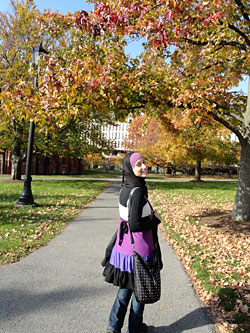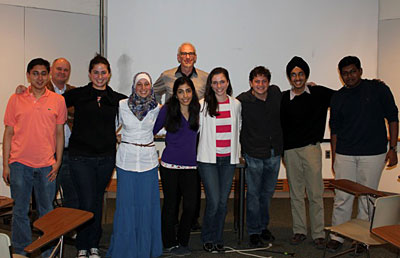Qatar pre-med students debate teams in Ithaca, NYC


A November trip of four Weill Cornell Medical College-Qatar (WCMC-Q) premedical students to the Northeast to debate teams in Vermont and New York mirrored a debate speech, said their accompanying faculty member.
"The conclusion of a good debate speech, like many satisfying pieces of writing, should echo its beginning," said Rodney Sharkey, professor of literature and debate coach at WCMC-Q. "In other words, there should be some sense of return, but also a sense of development, of learning, so that the return to the beginning, in the words of T.S. Eliot's 'Little Gidding,' is to 'know the place for the first time.'"
The four students and Sharkey, visiting the United States Nov. 4-11, first participated in the annual Huber debates at the University of Vermont in Burlington.
"At first the WCMC-Q students -- all relatively new to debate -- were wide-eyed in wonder and experienced not a little anxiety at the prospect of having to debate their transatlantic peers from Ithaca and other North American luminaries, such as Yale," observed Sharkey. "However, once they settled into the five-debates-a-day schedule, their nerves vanished and a sense of competitive camaraderie emerged. ... I was delighted to see the students grow in confidence, and in knowledge of implicit debate speech structure, all as the result of intense immersion in a high-intensity debate environment."
The Qatar contingent then took a bus across New York state with the Cornell debaters to Ithaca, where they debated the Cornell team. Arguing in favor of the motion "This House Supports a Two State Solution," WCMC-Q was narrowly beaten in the debate against Cornell Forensics Society, "but nonetheless acquitted itself very well against its more experienced counterpart," said Sharkey.
"Again, I couldn't but notice that the WCMC-Q contingent now debated without fear, and would improve immeasurably with a greater knowledge of current affairs on board."
Hosted by Cornell's debate coach and senior lecturer Sam Nelson, the visitors received gifts and attended a First Year Writing Seminar. Nelson, Sharkey and Risheek Kaul, a WCMC-Q pre-med student, also visited the MacCormick Secure Center, a juvenile detention facility in Brooktondale, N.Y., where they spoke with some of the minors incarcerated there about life in Doha and about the benefits of debate in general.
Before leaving the country, the group walked the Brooklyn Bridge from borough to borough, climbed the Empire State Building and toured Weill-Cornell Medical College in New York. "All three events filled the students with giddy excitement and no small degree of wonder, and then, before we were done, we drove out to Saint John's in Queens for our final debate," Sharkey said.
"On the bus I told the students that they were going to debate the same team that they had watched win the Vermont tournament, and there was barely a note of panic. Instead, the WCMC-Q debaters were focused, confident and distinguished by a belief in themselves. In the final analysis, it had been a long week since four nervous students scribbled down the first motion of the Huber Debates and there and then set about preparing seven minutes speeches in 15 minutes. A week later on the bus to Queens, things had come full circle. Yes, the WCMC-Q students were debating the same people, but they were now coming at it from a much deeper and richer place."
Media Contact
Get Cornell news delivered right to your inbox.
Subscribe